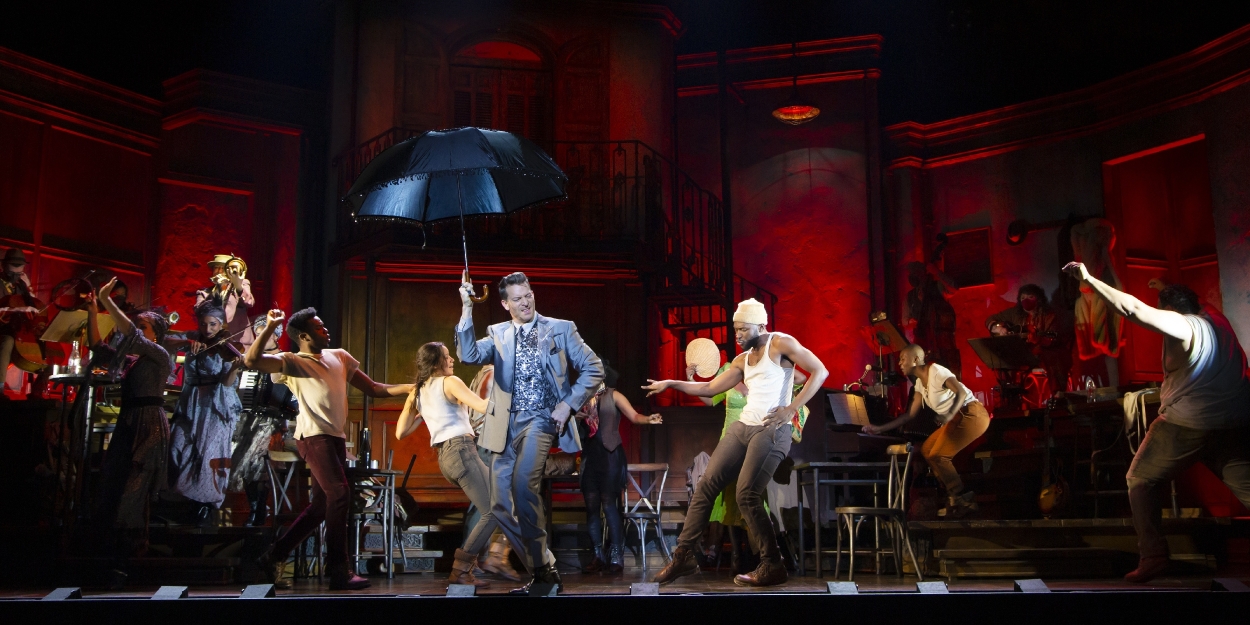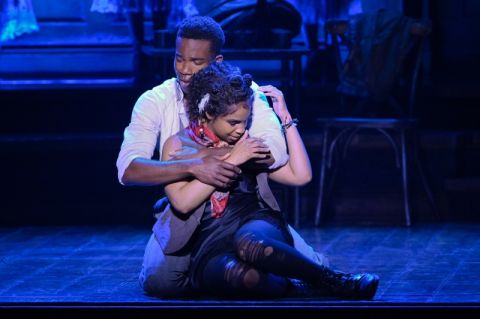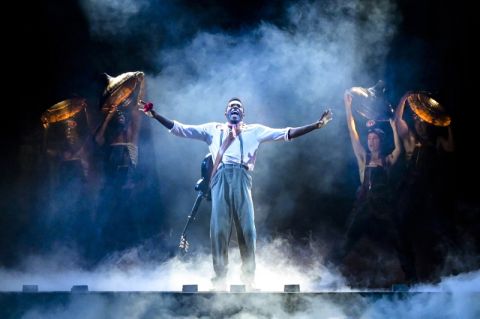Review: HADESTOWN at Ottawa's National Arts Centre
An extraordinary show that should not be missed – on stage through August 27th

Broadway Across Canada’s presentation of the Tony- and Grammy-award winning Hadestown, pulled into the National Arts Centre last night after a seven-week residency in Toronto.
Hadestown is a reimagining and intertwining of two classic Greek myths. In “Road to Hell”, the opening number, we are forewarned that the story is a tragedy. We are then introduced to each character by Hermes (Nathan Lee Graham), who serves as the narrator. The main players are the three Fates (Dominique Kempf, Belén Moyano, and Cecilia Trippiedi), Hades (Matthew Patrick Quinn), Persephone (Maria-Christina Oliveras), Euridice (Hannah Whitley), and Orpheus (J. Antonio Rodriguez).
Hades, the King of the Underworld, is only content when his wife, Persephone, is with him in Hadestown. However, for six months of the year, Persephone lives above ground and bringing the spring and summer seasons with her. In her absence, Hades has created an underground mine and power plant built and maintained by his slave-like workers.
Up above, the world of men is a dismal place rampant with hunger and poverty. Orpheus is a poor, but idealistic poet and songwriter, who is described by Hermes as being naïve. Euridice is a cynical young girl, longing for a better life. She believes that it is better to go it alone and take care of herself, since no one else will look out for her. When these two contrasting personalities meet, they invariably spark. Orpheus promises Euridice that, once he finishes his song, riches will be restored to the earth. He believes that, if people only take what they need, there will be enough for everyone, and it will last through the wintertime. Despite her initial misgivings, Euridice falls in love with Orpheus, but begs him to finish his song quickly. Persephone returns, and it appears that all will be well for a while. But then, an impatient Hades sends the train for Persephone, signalling an early winter for those above ground. Despondent, Euridice gives in to her inner fears, substantiated by the Fates. Euridice abandons Orpheus for the comforts of Hadestown, implied by Hades in “Hey, Little Songbird”. When Orpheus finds Euridice gone, he sets off to bring her back to the land of the living.
Anaïs Mitchell’s score is ultra catchy, a jazzy-folk mix that acts as the perfect medium to tell the story. The vocals are varied, which differentiate the characters and keeps the songs from becoming repetitive; Quinn truly shines here with Hades’ deep bass vocals. Rodriguez can reach unbelievably high notes, used to further represent Orpheus’s pure heart.

North American Tour. Photo by Kevin Berne.
Whitley, as a bedraggled Euridice reminiscent of a street urchin, complimented Rodriguez perfectly. The three Fates were often used as harmonies and they were magnificent, encircling their targets with gusto, continually reminding the audience that they were the physical incarnation of the characters’ deepest insecurities. I admit that I wasn’t a big fan of Oliveras’ portrayal of Persephone during the first act. When she goes to Hadestown, Persephone relies on a constant stream of liquor and drugs to get her through the winter. Consequently, her choreography in Act I is a bit wild, and Oliveras’ singing has a screechy pitch. This interpretation is ostensibly to emphasize Persephone’s drunken, drugged-out state, but it seemed excessive. In the second half, as Persephone tries to convince Hades to let the lovers go, Oliveras sings in a normal tone, and she performs quite well. Graham’s Hermes exudes charm and charisma; he had some impossibly big shoes to fill since it is difficult to envision anyone other than André De Shields in the role, but Graham made the role his own.
The choreography (David Neumann) had an abstract, modern dance feel that I really enjoyed, especially that of the swing as the underground workers. The use of a turntable in Hades’ mine and again later in the show as the path that Orpheus and Euridice must take to escape Hadestown was a clever use of the limited set (designed by Rachel Hauck). The set was on two levels and was somewhat reminiscent of the stage design of Smokey Joe’s Café. The lighting design (Bradley King) was wonderful; the use of the swinging lights during the soulful “Wait for Me” was hauntingly beautiful. That number was so visually spectacular that, coupled with Rodriguez’s incredible vocals, it ended being the highlight of the entire show for me.

Photo by Kevin Berne.
Even though Mitchell wrote some of the songs as far back as 2006, the lyrics were astonishingly prescient and continue to be relevant. This is particularly evident with “Why We Build the Wall”, delivered like an authoritarian speech by Hades. Hadestown speaks out against tyrannical leaders who will stop at nothing to amass personal wealth obtained on the backs of others. It also addresses the underlying capitalism that sustains this behaviour. Hadestown asks what is truly needed to achieve happiness. Ultimately, Euridice realizes that, with Orpheus by her side, she doesn’t need material things. Hermes reminds us that, even if the story doesn’t work out this time, it deserves to be retold again and again in the hopes that it may turn out differently. As a society, we would do well to heed the advice in Hadestown and learn from Euridice’s mistakes so that history doesn’t keep repeating itself.
Hadestown is an extraordinary show that shouldn’t be missed – it’s only on stage at the National Arts Centre through August 27th. Click here for more information or to buy tickets.
Reader Reviews


